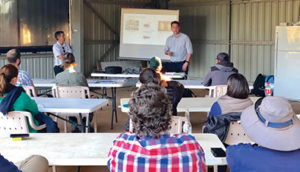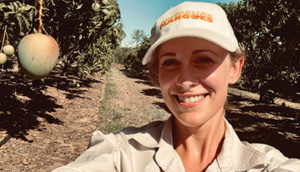Read the latest information on
Foot-and-mouth disease
Plant Health Australia and Animal Health Australia manage a number of biosecurity programs that employ officers or managers to provide advice to producers about aspects of on-farm biosecurity.
AHA’s Animal Health and Biosecurity Extension Team work closely with producers, the livestock industry and supply chain participants to build capacity and capability within the Australian animal health system.
The team of regionally-based managers provide tools and information to help livestock producers in the areas of biosecurity, traceability, disease surveillance and animal welfare.
More information and contact details for managers
Dairy Australia, through it’s eight regional offices has a network of over 35 Regional Extension Officers that service the needs of dairy farmers and service providers across all dairying regions in Australia. Dairy Australia’s Extension Network has skilled, motivated and experienced staff that connect with farmers and deliver programs, learning and provide resources across seven core areas: Feedbase & Nutrition, People, Animal Health, Welfare & Fertility, Farm Business Management, Soils & Irrigation, Feeding Systems and Climate & Energy.
If you’d like information on managing your dairy farm biosecurity, please contact your local regional office.
Grain growers across Australia are fortunate to have access to biosecurity advice specifically for their industry from Grains Farm Biosecurity Officers in each of the main grain growing states. Officers can work one-on-one with growers to explain simple yet effective ways they can reduce the risks posed by pests, weeds and diseases.
The Grains Farm Biosecurity Program is managed by Plant Health Australia and funded by growers through Grain Producers Australia together with the New South Wales, Queensland, South Australian, Victorian and Western Australian governments.
For free advice on any aspect of biosecurity, growers should contact their local Grains Biosecurity Officer.
The National Citrus Biosecurity Manager with Citrus Australia is Dr Jessica Lye.
You can email Jessica.lye@citrusaustralia.com.au or call 0427 352 742.

Vegetable and potato officer Callum Fletcher speaking to growers in Carnarvon, WA, while Vegetables WA Vietnamese industry extension officer, Truyen Vo, translates. Image courtesy of AUSVEG
The vegetable and potato grower levies fund the Vegetable and Potato Biosecurity Program, managed by AUSVEG and Plant Health Australia.
The Vegetable and Potato Biosecurity Officers, who work for AUSVEG, aim to improve the biosecurity risk, preparedness and response mechanisms within the vegetable and potato industries. They facilitate cooperation between vegetable and potato growers, government departments and industry groups, carry out ad hoc projects and provide advice as required.
More information about the officers and the program is available on the AUSVEG website.
To help beekeepers to implement biosecurity measures and to ensure that they are complying with the Australian Honey Bee Industry Biosecurity Code of Practice and relevant legislation, Bee Biosecurity Officers are employed within six state departments of primary industry.
The biosecurity officers are there to provide training and education. If there is an exotic pest incursion, the biosecurity officers will be on hand to provide expert support to industry, and to help design and implement response measures.
To contact a Bee Biosecurity Officer, and for more information about the code of practice, pollination of crops by honey bees, pests, news and videos, go to the BeeAware website.

Cairns-based industry development officer with the Australian Mango Industry Association, Marine Empson. Image courtesy of AMIA
Other industries – for example Nursery and Garden Industry Australia, Melons Australia and Mangoes Australia – have appointed specialists to help growers to implement biosecurity measures on-farm. Please contact your peak industry body for further details, and don’t hesitate to take advantage of the biosecurity advice on offer.